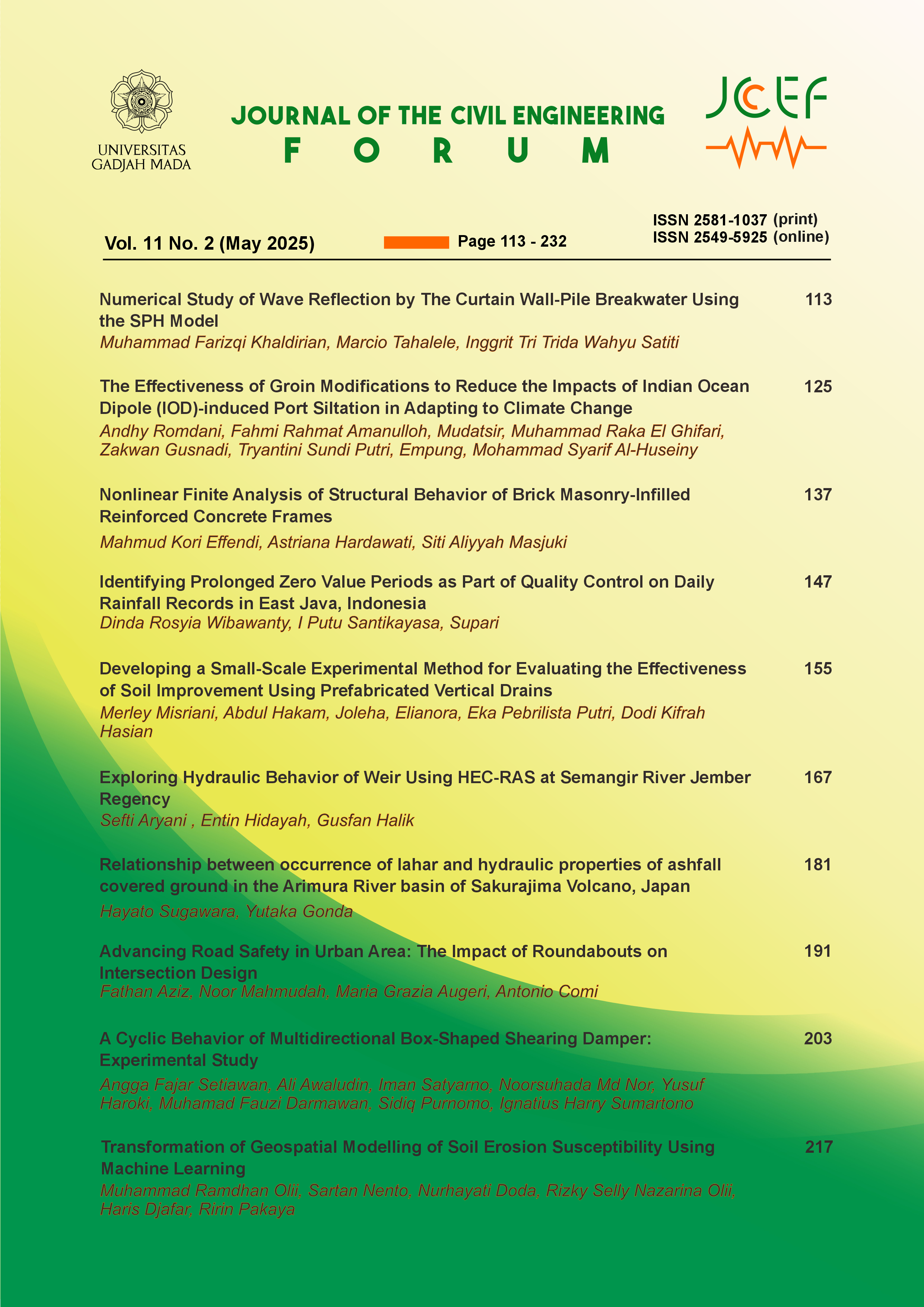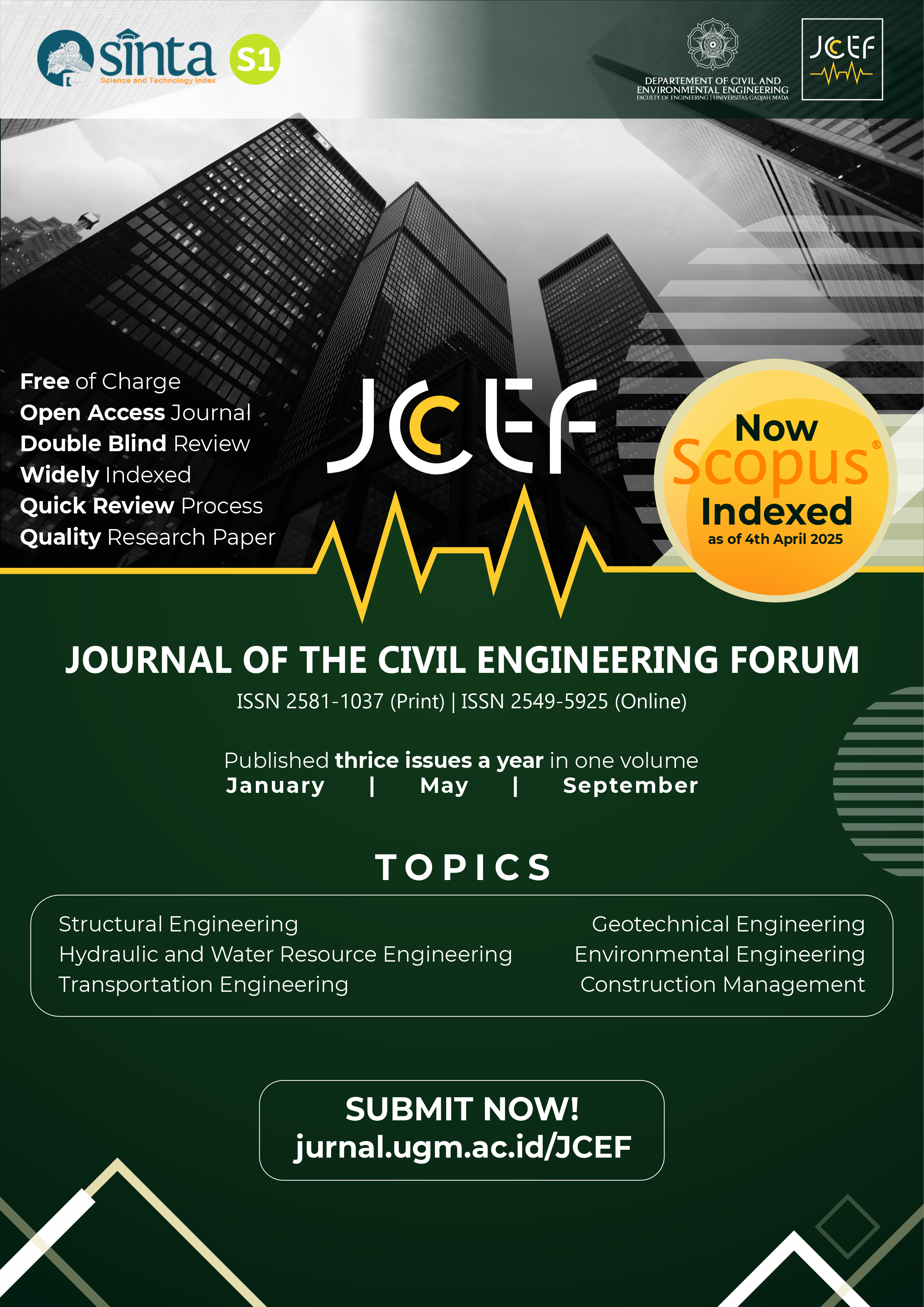Exploring Hydraulic Behavior of Weir Using HEC-RAS at Semangir River Jember Regency
Abstract
Flooding significantly impacts communities living along riverbanks, causing severe damage to infrastructure and properties. The flood event on January 9, 2022, in Bumi Mangli Permai and Mangli Residence Housing, heavily damaged access roads. Effective flood control is essential to mitigate these risks, and one viable solution is the implementation of long storage systems, particularly motion weirs. This study explores the hydraulic behavior of the Semangir River in Jember Regency using the HEC-RAS program to model both fixed and motion weirs. Utilizing the SUH Nakayasu method, peak discharges for 25-year, 50-year, and 100-year return periods were estimated. The analysis revealed that the existing weir's design is inadequate for the 50-year return period. However, simulations indicate that a motion weir with gate dimensions of 1.5 m x 1.75 m offers improved hydraulic conditions, reducing water surface elevation and flow velocity compared to both the existing and initially planned weirs. These findings support the adoption of motion weirs as an effective flood control strategy for the Semangir River.
References
Balaian, S. K., Sanders, B. F., & Abdolhosseini Qomi, M. J. (2024). How urban form impacts flooding. Nature Communications, 15(1), 1–10. https://doi.org/10.1038/s41467-024-50347-4
BNPB (2022), Laporan harian pusdalops bnpb (Minggu, 08 januari 2023).
Bush, S. T., Dresback, K. M., Szpilka, C. M., & Kolar, R. L. (2022). Use of 1D Unsteady HEC-RAS in a Coupled System for Compound Flood Modeling: North Carolina Case Study. Journal of Marine Science and Engineering, 10(3). https://doi.org/10.3390/jmse10030306
Chanson, H., & Apelt, C. J. (2023). Environmental fluid mechanics of minimum energy loss weirs: hydrodynamics and self-aeration at Chinchilla MEL weir during the November–December 2021 flood event. Environmental Fluid Mechanics, 23(3), 633–659. https://doi.org/10.1007/s10652-023-09926-0
Chow, V. T., Maidment, D. R. and Mays, L. W. (1988), Applied Hydrology, McGraw-Hill Book Co.
Dickel, S., & Theobald, S. (2024). Innovative control strategy for flood mitigation through a combination of barrage management on impounded rivers and polders. Natural Hazards. https://doi.org/10.1007/s11069-024-06648-4
Eizeldin, M. A., Ali, A. M., & Farag, A. M. I. R. A. S. (2023). Investigation of flow characteristics downstream vertical sluice gates of Bahr Yousef regulator physical model. Water Science, 37(1), 225–238. https://doi.org/10.1080/23570008.2023.2236385
Ghimire, E., Sharma, S., & Lamichhane, N. (2020). Evaluation of one-dimensional and two-dimensional HEC-RAS models to predict flood travel time and inundation area for the flood warning system. ISH Journal of Hydraulic Engineering, 28(1), 110–126. https://doi.org/https://doi.org/10.1080/09715010.2020.1824621
Guido, B. I., Popescu, I., Samadi, V., & Bhattacharya, B. (2023). An integrated modeling approach to evaluate the impacts of nature-based solutions of flood mitigation across a small watershed in the southeast United States. Natural Hazards and Earth System Sciences, 23(7), 2663–2681. https://doi.org/10.5194/nhess-23-2663-2023
Halik, G. (2018), Pemodelan Hidroteknik, UPT Percetakan dan Penerbitan Universitas Jember.
Hidayah, E., Halik, G., Indarto, I., & Khaulan, D. W. (2022). Flood hazard mapping of the Welang river , Pasuruan , East Java , Indonesia. Journal of Applied Water Engineering and Research, 1–12. https://doi.org/10.1080/23249676.2022.2114025
Hidayah, E., Halik, G., Indarto, I., & Khaulan, D. W. (2023). Flood hazard mapping of the Welang river, Pasuruan, East Java, Indonesia. Journal of Applied Water Engineering and Research, 11(3), 333–344. https://doi.org/10.1080/23249676.2022.2114025
Hou, Y., Zhang, L., Dong, R. Y., Liang, M. Y., Lu, Y., Sun, X. Q. and Zhao, X. (2021), ‘Comparing responses of dairy cows to short-term and long-term heat stress in climate-controlled chambers’, Journal of Dairy Science 104(2), 2346–2356. URL: https://doi.org/10.3168/jds.2020-18946
Kang, J. N., Wei, Y. M., Liu, L. C., Han, R., Yu, B. Y., & Wang, J. W. (2020). Energy systems for climate change mitigation: A systematic review. Applied Energy, 263(January), 114602. https://doi.org/10.1016/j.apenergy.2020.114602
Kim, B. J., Hwang, J. H., & Kim, B. (2022). FLOW-3D Model Development for the Analysis of the Flow Characteristics of Downstream Hydraulic Structures. Sustainability (Switzerland), 14(17). https://doi.org/10.3390/su141710493
Kondolf, G. M., Rubin, Z. K., & Minear, J. T. (2014). Dams on the Mekong: Cumulative sediment starvation. 5375–5377. https://doi.org/10.1002/2013WR014979.Reply
Kustamar, K., Susanawati, L. D., Nainggolan, T. H., Witjaksono, A., & Ajiza, M. (2019). Performance Analysis of Long Storage and Tidal Controlling Gate on the Flood of Kemuning River. Journal of Physics: Conference Series, 1375(1). https://doi.org/10.1088/1742-6596/1375/1/012008
Mahlil, M., & Sudinda, T. W. (2022). Optimization Study of Gate Operation Rule in Ciawi Dam As Flood Control Function. Jurnal Teknik Sipil, 18(1), 118–139. https://doi.org/10.28932/jts.v18i1.4517
Mitsopoulos, G., Panagiotatou, E., Sant, V., Baltas, E., Diakakis, M., Lekkas, E., & Stamou, A. (2022). Optimizing the Performance of Coupled 1D/2D Hydrodynamic Models for Early Warning of Flash Floods. Water (Switzerland), 14(15). https://doi.org/10.3390/w14152356
Nash, J. E. (1957), The form of the instantaneous unit hydrograph, in ‘International Association of Hydrological Sciences General Assembly’, Vol. 3, Toronto, pp. 114–121.
Ogras, S., & Onen, F. (2020). Flood Analysis with HEC-RAS: A Case Study of Tigris River. Advances in Civil Engineering, 2020. https://doi.org/10.1155/2020/6131982
Paksi, R. S. J., Dermawan, V., & Andawayanti, U. (2021). Kajian Hidrolika Bangunan Pelimpah Samping (Side Channel Spillway) Bendungan Pomalaa Kabupaten Kolaka Provinsi Sulawesi Tenggara Dengan Uji Model Fisik 1:40. Jurnal Teknologi Dan Rekayasa Sumber Daya Air, 1(2), 750–763. https://doi.org/10.21776/ub.jtresda.2021.001.02.34
Prawira, A. B., Hidayah, E., & Wiyono, R. U. A. (2024). Mapping the Lava Flood Hazard Using the Flood Discharge Approach and 2D Hydrodynamic Modeling at the Rejali River, Mount Semeru. Journal of the Civil Engineering Forum, 139–150. https://doi.org/10.22146/jcef.8463
Salmasi, F., & Abraham, J. (2023). Hydraulic characteristics of flow over stepped and chute spillways (case study: Zirdan Dam). Water Supply, 23(2), 851–866. https://doi.org/10.2166/ws.2023.011
Samir, Y., Moussa, A. M., & El-badry, H. M. (2019). Hydrodynamic Study of Nile River Using 1D Model.
Sarchani, S., Seiradakis, K., Coulibaly, P., & Tsanis, I. (2020). Flood inundation mapping in an ungauged basin. Water (Switzerland), 12(6), 1–21. https://doi.org/10.3390/W12061532
Sari, P., Legono, D., & Sujono, J. (2018). Performance of Retarding Basin in Flood Disaster Risk Mitigation in Welang River, East Java Province, Indonesia. Journal of the Civil Engineering Forum, 4(2), 109. https://doi.org/10.22146/jcef.31938
Shah, M., & Lone, M. A. (2022). Flood Modeling and Simulation Using HEC-HMS/HEC-GeoHMS and GIS Tools for River Sindh-NW Himalayas. KN - Journal of Cartography and Geographic Information, 72(4), 325–333. https://doi.org/10.1007/s42489-022-00116-4
Snyder, F. F. (1938), ‘Synthetic unit-graphs’, Eos, Transactions American Geophysical Union 19(1), 447–454. URL: https://doi.org/10.1029/TR019i001p00447
Sumanda, V. A. (2022), ‘Perencanaan ulang sistem drainase perumahan bumi mangli permai kecamatan kaliwates kabupaten jember’.
Syaifudin, A. (2022). View of Model Aliran 2-D untuk Memprediksi Gerusan dan Sedimentasi di Saluran Jakabaring Sport City (JSC) Palembang.pdf. Journal of Water Resources Engineering, 13(1), 90–99.
Thornton, P. K., Ericksen, P. J., Herrero, M., & Challinor, A. J. (2014). Climate variability and vulnerability to climate change: A review. Global Change Biology, 20(11), 3313–3328. https://doi.org/10.1111/gcb.12581
Zaffar, M. W., Hassan, I., Latif, U., Jahan, S., & Ullah, Z. (2023). Numerical Investigation of Scour Downstream of Diversion Barrage for Different Stilling Basins at Flood Discharge. Sustainability (Switzerland), 15(14). https://doi.org/10.3390/su151411032
Zahroni, A., Nugroho, E. O., Harlan, D., Soentoro, E. A. and Aprilian, Z. (2024), Estimation of debris flow using curve number analysis for the mount agung volcanic event, bali, indonesia, in ‘E3S Web of Conferences’, Vol. 476, pp. 1–13. URL: https://doi.org/10.1051/e3sconf/202447601015
Copyright (c) 2025 The Author(s)

This work is licensed under a Creative Commons Attribution-ShareAlike 4.0 International License.
Copyright is granted to authors for the purpose of providing protection for articles written to describe experiments and their results. JCEF will protect and defend the work and reputation of the author and are also willing to address any allegations of violation, plagiarism, fraud, etc. against articles written and published by JCEF. JCEF is published under the terms of the Creative Commons Attribution-ShareAlike 4.0 International License (CC BY-SA 4.0). The author holds the copyright and assigns the journal rights to the first publication (online and print) of the work simultaneously.







